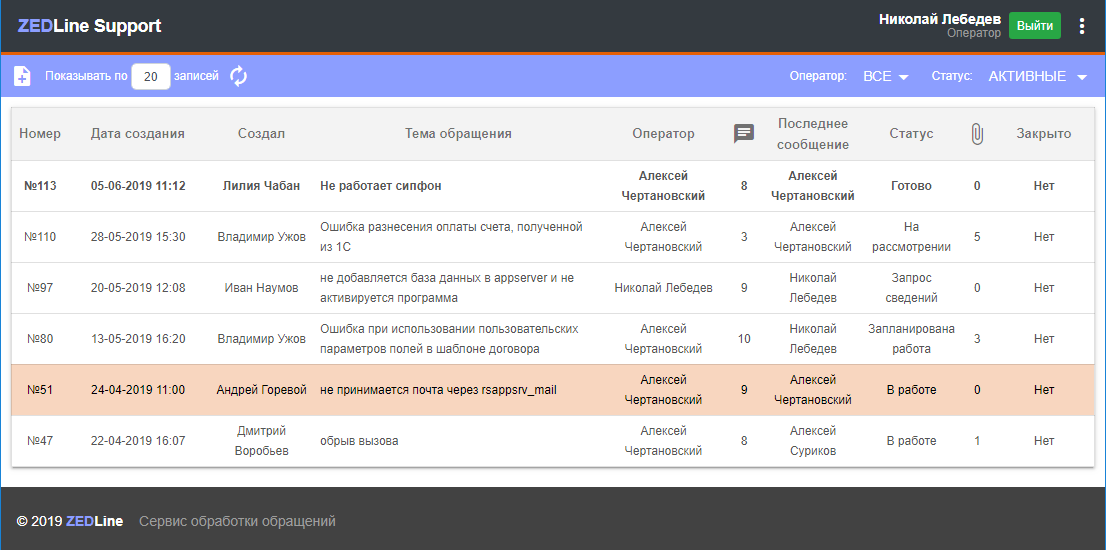Often in small business we do everything in a row, without noticing that: the test server will be restarted, which we ourselves will let the client know in the chat instead of the engineer; hang up a banner - wait a minute, I have access to the admin panel, ready; analytics code - let’s hang Tag Manager and show you how to place any tags through it; here in the unloading there were suspicious peaks and failures, I made additional details for you ... The situation is especially difficult in companies that are actively working on customer requests, and each employee takes on the most diverse tasks. As a result: fatigue, burnout, mistakes and blockages of their own outstanding tasks. Is that familiar? Let's look for reasons and solutions under the cut.

Why it happens?
There are a lot of reasons why an employee takes on an unbearable amount of tasks. If you are not a business owner and do not receive a direct share of the profits, you need to look for your reasons in the list below. Yes, and if the owner, however, also - and this happens.
- The employee strives to prove his worth. If a person is not confident in himself, he has difficulty identifying himself in a profession - he is depressed by comparing himself with other colleagues, career success stories, and even with successful finds of competitors. Therefore, he finds a way out: to become multi-tasking and prove his worth by closing task after task, working 12 hours a day and not stopping at the weekend.
- Sometimes the reason for pulling yourself to various jobs is the desire to play it safe : if you have a lot of working threads tied to you, and you work on all fronts, the likelihood of getting fired or reduced in difficult times is reduced. So, you need to take advantage of the inertia and laziness of colleagues and become indispensable.
- Someone else’s work is often done by just capable, smart and collected people. They are easily given their tasks, it is not difficult to take strangers, and even organize a part-time job on freelance. They are strong workaholic professionals who like to perform tasks well and do not like to drink coffee with colleagues five times a day. As a rule, they value and love the company and projects, therefore they work rather selflessly for everyone to be better than they are.
- There are times when an employee simply likes his work , he is passionate about it and does it with pleasure. You don’t notice that such work has ended. Moreover, to drop the case at the final stage is simply indecent. Here’s another half hour - I’ll finish this projection and run home so that tomorrow I don’t return to it, but do other things :).
- It happens that you helped and this has become the norm . Indeed, at first it seems that there is nothing special in helping colleagues. However, probably many of the readers are familiar with this tangle: first, send the link, then help, then come, then show, at the end, “Do it, please, quickly, otherwise I’ll pick these three lines of the report for two hours.” Gradually, such appeals become the norm and if you refuse, you will become the worst person. The employee does not want to be bad, and advises left and right, does, helps, and then the light in his office goes out after 22:00 ...
- Surprisingly, the novice’s syndrome becomes the reason for the “piled work”. A man comes to a new office, shows his knowledge and skills to the full, so as not to hit the dirt in the face, and then according to the standard scenario, “Well, if you’re so smart, you can do this too.”
- One of the most common scenarios: the head does the work for subordinates , because he is scared or necessary or ashamed of the poor quality of the unit. And this is not the notorious micromanagement and perfectionism, it’s just a desire to do the job at least acceptable. Naturally, subordinates relax, because the boss is well done, they perform tasks even worse, and he forgets not only to eat, but also to go to the toilet.
- Sometimes work drags on because of the routine . This is the fruit of poor business organization: several processes drag on at the same time, and there are no options to do something in sequence, you have to do it all at once.
- During a crisis (in the economy or in the heads of top managers), the reason for loading tasks for one or two employees is the desire to plug all holes with the help of a pair of staff units . That's right, why hire new ones if these ones have
not yet died? The same story happens when they ask to be replaced until they find a new employee, but nothing changes even after hiring three more - they are newchildren, have not yet moved in, and then they have a new job, they are not up to the responsibilities for which they were hired.
- There are people according to the nature of the “rescuer” character : they don’t need to curry favor, they are professional, they don’t buy the friendship of colleagues, they have a normal load, but they still take the work for themselves. The reasons are simple - pity and kindness, they are so brought up, it comes from childhood. The team takes kindness for weakness and actively uses the services of a good colleague.
- The most vile reason to take over someone else's work is friends in a team . Just remember: if your friend allows you to work for him, he is not a friend. After your or his departure from the company you will not even hear about him.
Three lines of advertisingUsually in one office mega-workaholic several reasons are mixed, purely one or two motives are rare. But there are general external signs by which such a person can be recognized.
We are against time control and any trackers at work - we are for convenient working tools for employees. Our new cloud helpdesk ZEDLine Support is a useful software for any support service, internal and client. The start takes 5 minutes, the setting is 30-60 minutes. Join now!
- Such people, as a rule, are boring in conversation - and not at all from the fact that they live by work, it’s just that their heads are busy with thoughts about work processes and it’s psychologically difficult to switch to a Saturday trip or discuss a new series, viewed at night.

- Such people are often angry - they are tired. No, they do not blame anyone for congestion, just a tired person with a smile smiles, you can check in practice.
- These guys very rarely talk about processing, recognize and even realize their workload. They consider their mode of operation and its intensity to be the norm and even get a kick from it.
- In the team, these employees are considered cranks, weaklings or tough careerists - it depends on other options of a colleague's character. Alas, misunderstanding prevails over appreciation and gratitude (ha ha ha).
- These employees never seek out leadership, show off, or report on the results on one hundred colorful pages and buildings. portal, for which they often turn out to be underestimated, or even fall under the hot hand because "you drag more - more responsibility."
- On the tables of such guys and girls there is an almost full mug of cooled tea or coffee :-)
Surely you, reading this article, smiled when you recognized yourself or a colleague. But the time has come for a difficult revelation: such guys in the team are very bad for a company, especially in a small business, where every employee has great influence. And it would seem that the usual Pareto principle works: 20% of employees do 80% of the work. But how shitty it sounds in terms of staff costs ...
So why is this bad?
- The most productive employees will quickly become burnt out, because the load and responsibility will do their job. As a result, either they become ill, trying to overcome the burnout, or the work will rise, because their hands fell.

- It’s difficult to do a lot of work well, so you will either get mistakes in the work (often stupid and offensive), or a deadline (until everything is done well).
- Employees who are able to carry on themselves many diverse tasks are hardly implemented in their careers, although they deserve it like no one else. The fact is that the constant switching between different types of work allows you to be a wide specialist and leaves no chance and time to penetrate the depths of some narrow sphere of knowledge.
- The relaxed employees, for whom the work is done, will decide that the rest of the affairs will be done by itself, so you can lower the sleeves, pour coffee and turn on the YouTube.
- Sooner or later, conflicts will arise in the team that will come either from overworked employees due to general injustice, equal pay for different workloads, etc., or from “underloaded” people due to tension in relations, demands to take even more work , problems with leadership and even because of general arrogance.
In any case, sooner or later it will result in a loss of income or customers (and there, income).
In principle, this situation can occur in any unit, but more often than not, overloads due to other people's tasks happen in several:
- technical support and any support: “Take a ticket, your theme”, “Take a ticket, I run to the pharmacy”, “Answer there, otherwise I don’t know”, “Oh, you answer so cool - answer mine too”;
- development: “Your code is cleaner, but you don’t have time”, “OOP passed me by,” “Well, what does it cost you to close three bugs there”;
- Marketing and advertising: “Look at the settings for advertising”, “And write an ad”, “Oh, how is it in English”, “And do this campaign too, you get it.”

So dismiss them?
No, of course - you don’t want to reduce labor efficiency yourself. It is necessary to take managerial and operational measures in order to use this potential for the benefit of the company and at the same time not to dampen the rest.
No need to push
Be sure to refer to the types above and try to understand which one you are dealing with. Based on this, you need to work with an employee, build a conversation. If you do not see the reasons for the overload of employees or your colleagues, you do not know much about the company. Throw hobbies during working hours and reading Forbes (or Habr) and be closer to subordinates or colleagues.
Threats to hard workers will not help in any way - they will not understand why they criticize them, because so much work has been done. Therefore, any reproaches, threats, any pressure will be regarded as negative and militia against the employee, will cause anger and stress. The worst thing you can say is, "You haven't been on vacation for a long time, go." This will be interpreted as a desire to prove that you are an unnecessary employee.
Look for management practices
Automate work in those units where there is a problem. If it’s about sales and marketing, install CRM with a separation of access rights, in which each employee will have their own area of responsibility, their plan, their KPIs, and any delegation cases will be logged and, for example, if you notice a periodic change of manager from Ivanov’s clients to Prokhorov, then Prokhorov is clearly processing, and Ivanov clearly decided to turn working time into free time.
If we are talking about support, technical support and any employees who communicate with external clients or with employees as internal clients (system administrators, for example), use ticket systems, they are inexpensive, but they clearly show the tasks (calls and requests), progress work, the result and, as in CRM, a change of manager. For example, we have developed for such purposes the cloud help desk ZEDLine Support , in which it is very convenient to take into account all customer requests and work with them. In this case, you will not lose time on training and adaptation of personnel to software - the setup will take no more than an hour, and the development of the interface - 5-10 minutes.

Try KPI
If applying KPI to programmers is difficult and in many cases simply undesirable, then KPI for the commercial and support services is a managerial necessity and a cool motivator. The main thing is to make the indicators measurable, understandable and dependent on real achievements, and not on personal relationships (for example, “close 17 service tasks” is an indicator, but “according to colleagues’s assessment is polite by -2” is an occasion to dismiss the originator of such a KPI).
How to get out of such a peak for the employee himself?
In this block, it would be possible to positively and instructively describe psychological methods and other corporate therapy, but no. This will not work.
The first thing you need to do is understand that overloading someone else's work does not make you a superhero, but makes you lose balance between a valuable team player (namely, these move the company) and overloaded work with a brow (they plow hellishly and do not always move, because there is no time left for vector definition).

The second is to understand what you are doing to your colleagues badly: they are depreciating, they look pale against your background, and they hate and fear you very much.
Third: you will have to return the work to those who have said goodbye to it and have lost touch with this part of the business, you will have to refuse and defend your workspace and your employment. You will become a bastard. Humble yourself, this is not for long.
You can google hundreds of methods of dealing with workload and inability to say no, go to a psychologist, talk with the boss under a glass of bourbon or with colleagues under a beer box, quit (by the way, the most stupid thing is that the same thing will start on a new job), - that will be easier for you. But first of all, you need to learn the scheme of work with further requests, inquiries or your desire to hold in your hands the strings from all the tasks of the company.
The algorithm is simple
Rate the request
First of all, understand who came to you: the employee frightened by the new task, whom it is enough to send, or the terry delegate who is best sent. Then figure out what you have to sacrifice to fulfill the task of a colleague, how resource-intensive it is for you. Do not give an answer right away, think and come back with a thoughtful refusal or consent - so you will only respect.
Identify Priorities
When analyzing a task, remember that you will not only move one of your tasks, you will “go” all your personal planning, including personal time after work, because no one will do your work for you. As a rule, if an employee or a boss is ready to shift the task to someone, she “suffers”, that is, you can agree to do it when you are done with your main job. Moreover, I’ll say a terrible thing now: 90% of office work can wait several hours.
Estimate the timeline
Designate to colleagues how much time you will spend on the task, how much you can allocate to it, and when exactly. For example, “I will prepare a request for this upload, but only tomorrow after lunch, it will take about three hours.” If your company has the practice of providing hourly reports on work (alas, there are such companies in IT, and there are a lot of them in other areas even more), warn a colleague that you will be forced to add this task to the report ("Vasya, I will not dream up for three hours, I will have to indicate this work directly"). I’ll tell you a secret: the likelihood that your delegator will suddenly cope on his own increases sharply after such words.
Rate and discuss options
Sometimes it’s easier for you to do the work so that your colleague gets rid of it, sometimes it’s easier to spend time once and learn how to do the task quickly and well. Evaluate what is optimal for you in terms of labor costs and is strategically more profitable. You can also do some of the work and offer to finish it to a colleague yourself - but be prepared that you will be pulled another hundred times.
The most effective way is to work on credit (like money). If you were asked to do something for another, you need to set an “invoice”. I’m doing you now, you will help me later. If a colleague does not fulfill his duty, then the next time he seeks help, you will have an iron argument: you close the old debt first, then come for a new one.
Only after their work!
If you decide to take the task - do it only after your main work, strictly indicating that this is a one-time act of help, and not a translation of the work.
Some tips
No matter how your relations with colleagues and refineries develop due to other people's tasks, whatever reasons you may be leading, it is important to remember that you are acting in the triangle of relations “team - you are the boss”, and you have to reckon with everyone.
- Do not say “This is not my job, I will not do it” - most of the leaders will perceive it negatively. Usually, the leader is interested in the result, and not who exactly and when will achieve this result. For the same reason, you should not shake job descriptions in front of the head of the head and read them out loud with the tedium of a lawyer - your principles will be quickly spread out by the jambs and mistakes you have found.
- Do not take on the mission of the corporate rescue service - do not put out other people's fires and drag on yourself all the failed processes of the company. It’s not that you need to be indifferent - the fact is that you won’t be able to cope with everything at once, just spend your energy and become responsible for most failures. Even if the team failed, this is no reason to blame yourself - this is an opportunity for you, together with your colleagues and management to analyze the errors and possibly reach a new level.
- Avoid contact with the main lovers to delegate their tasks - let them look for other victims.
These three rules will help you take the first step towards maintaining a working relationship within the team and avoiding congestion problems.
It may sound rude, but your knowledge, skills and experience is your product that you need to sell and value. This is very difficult, and the more difficult the more you love your work and the product you make. This is due to grievances and difficult relationships, when you may be the most underrated employee. But the main thing is that you are strong in your knowledge, independent within professionalism and ready for any turn. It remains to learn to respect yourself.